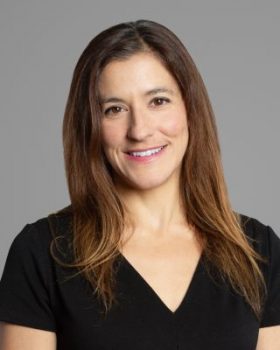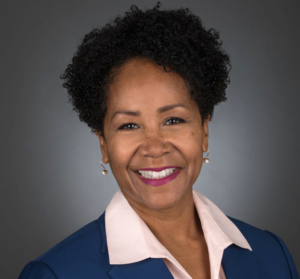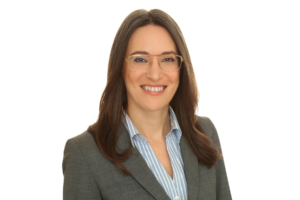By Monisha Jayakumar, Portfolio Manager with Wells Fargo Asset Management’s Analytic Investors Team
 Imposter Syndrome. It’s a term I’ve heard a lot recently. It seems mysterious and eerily like a medical diagnosis—but fear not, it isn’t.
Imposter Syndrome. It’s a term I’ve heard a lot recently. It seems mysterious and eerily like a medical diagnosis—but fear not, it isn’t.
It’s just a tiny critical voice in your head that says “You don’t belong here!” when you’re on the brink of doing something courageous. It calls out when you are about to speak in front of an audience, take on a new role, pitch a new idea in an email, raise your hand and ask a question, or consider asking for a raise. So when we encourage people to speak up, stand up, and be seen, what if you are the one holding yourself back?
My title at work is portfolio manager with the Analytic Investors team within Wells Fargo Asset Management. I oversee approximately $8 billion in quantitative factor-enhanced strategies. In plain speak, I work with financial data and code processes to extract useful information that our team uses to make investing decisions for our clients’ assets.
As someone who analyzes data to create usable information, I have found that imposter syndrome is ubiquitous. My informal data collection—which includes many smart, ambitious, and successful women and men in my book clubs, parent groups, and friend circles—tells me that this lurking feeling of inadequacy at work is a feeling many of us share. We just haven’t had the courage to openly discuss it at the workplace.
I recently came across the work of Brené Brown, a courage and vulnerability researcher. In delving into her book Daring Greatly, I discovered a contrary idea to the years of “fake it till you make it” advice I’d been getting. Brown states: “Courage starts with showing up and letting ourselves be seen. True belonging only happens when we present our authentic, imperfect selves to the world.” According to the author, courage requires embracing three things: vulnerability, uncertainty and risk. She goes on to make a radical connection: without vulnerability and courage, there’s no creativity and innovation.
Courage is about vulnerability. Vulnerability builds trust and authentic connections. Isn’t that what businesses need? During the summer before graduate school, I was assigned heaps of summer reading that I did not get through. My “imposter” self was convinced that everyone else probably knew the reading assignment forwards and backwards. Anxiety rumbled that morning during our orientation breakfast when a fellow classmate whispered, “I still have several chapters I haven’t finished and I’m kind of nervous about it.” Pure relief and an authentic friendship ensued.
Courage is being okay with uncertainty. I was once afraid to ask for a pay raise for eight years. The small employee-owned firm that I was with at the time regularly researched pay scales and provided timely pay raises. But I am fully aware this is not commonplace. When I debated asking for a raise—something I believe was well earned—I would hear that “imposter” voice that doubted my worth. Accepting the uncertainty of an outcome is the key to your courage and vulnerability. When I let go of being wedded to a specific outcome, it became easier to express myself. And despite the discomfort of the conversation, there was great comfort in knowing I advocated for myself.
Courage is about risk taking. If you work in a profession where you stand out, it means you took a risk. There was a time when I didn’t understand that gender differences really matter. Why would I care if 10% or 50% were women? But here’s the thing: The more people who’ve done this before, looking or sounding exactly like you, the more confident you feel replicating prior success. In some ways it was motherhood that made me stop pretending it didn’t matter if I was a woman. In grappling with reasonable expectations I could set about maternity leave, a mentor said, “No one can do your job like you do it.” I realized that what I need, and what we all need, is different. I also realized what I contribute is different. I began asking for what I needed from a place of self-worth instead of a place of fear. Have the courage to value your uniqueness and own your seat at the table.
If there’s no courage, there’s no creativity and innovation. People and corporations both value these tenets – but are we making room to empower one another to truly be courageous? At some point in our careers, we’ve all seen unhealthy posturing. In my industry, the loud hyper-competent facade doesn’t serve anymore. What if being courageous enough to be vulnerable is the antidote? What if being authentic could be the key to actually shedding this personal and collective “imposter” syndrome?
Looking forward, I want to grow within the system but also encourage it to expand. So here’s my call to action. Risk being vulnerable: when you take on a new role or when you have changes in your personal life, share your fears and hopes. Accept uncertainty and have the uncomfortable conversations on inclusion and pay transparency. Take chances. If you are asked to speak at a conference, ignore the “imposter” voice and say yes, and empower others to do the same. Participate in creating the culture you wish could be created for you. And then watch that spark light the fire.

 Perspective is a wonderful thing, finds Katten’s Karen Nelson.
Perspective is a wonderful thing, finds Katten’s Karen Nelson.






